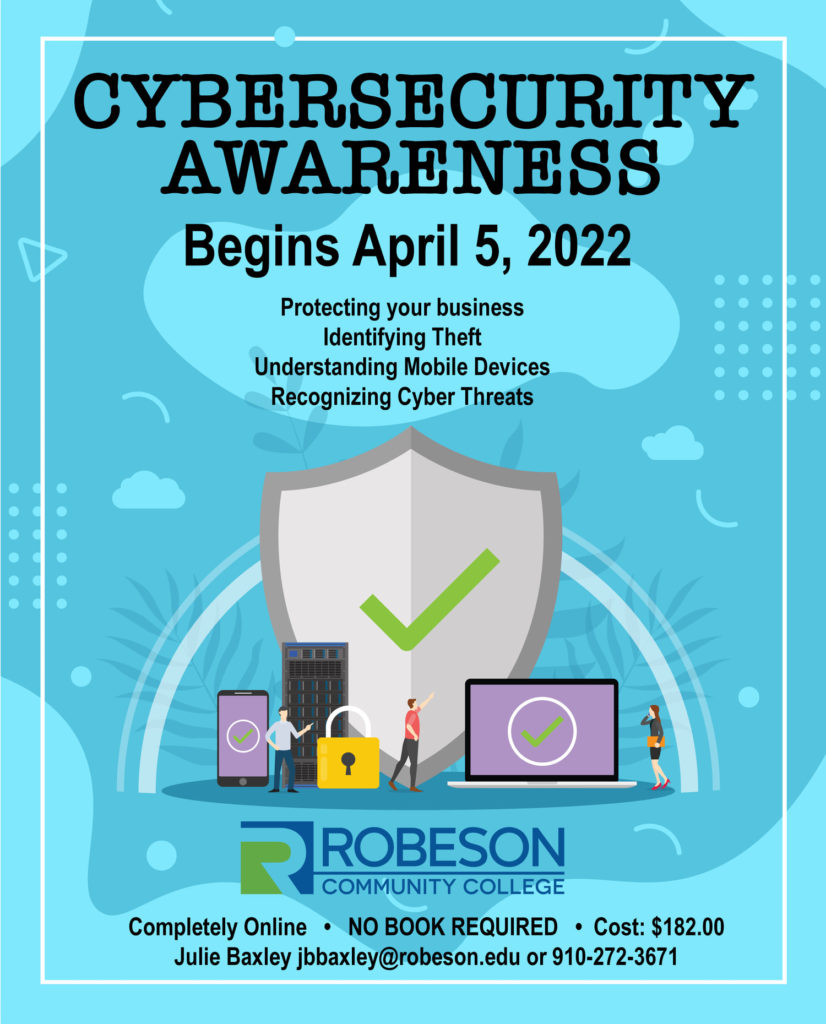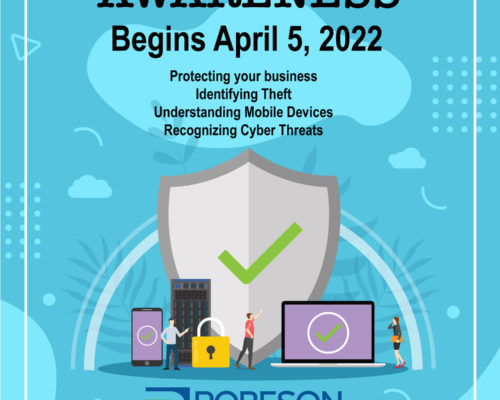
Cybersecurity class aims to give users, businesses peace of mind
It’s a photo in a random text message. It’s a link sent to you by someone that says they have a job offer. It’s a file that you downloaded from the internet. It’s an email that you thought was legit.
It’s a cyberattack. One you didn’t see coming.
Cyberattacks come in many forms and they can happen in the blink of an eye. Unfortunately, the impacts of such attacks can last much longer.
That’s why Robeson Community College has decided to offer a new continuing education class in cybersecurity awareness so that individuals and businesses can have the knowledge, the resources, and the tools available to protect themselves from criminals.
“Cybercriminals want to cause maximum damage,” said RCC President Melissa Singler. “Cybercrimes are profitable for bad guys and costly to you. Education is the key to changing the statistics and learning how to protect yourself and your business from falling victim to their schemes.”
A 2021 Cost of Data Breach Report by IBM shared breaches that occurred between May 2020 and March 2021 cost an average of $4.24 million, and according to RiskIQ, the average cybersecurity incident costs businesses an average of $1.8 million per minute.
And since the Russian invasion of Ukraine on February 24, cyberattacks have increased dramatically, up more than 116%, in NATO countries.
Jen Easterly, director of the Cybersecurity and Infrastructure Security Agency, stated during a call on the Russian threat that “we should consider every sector vulnerable, in some ways we should assume that disruptive cyber activity will occur.”
But it’s not just the threats from foreign entities that we should be concerned about, as Jane, a victim of cybercrime who wishes to remain anonymous has discovered.
“When it happened to me, I had no idea that there was a virus on my computer and I had no idea about the ramifications of it,” said Jane.
“My email started getting spammed a lot. Weird things were happening on my computer that I couldn’t make sense of. My files and emails started disappearing,” said Jane. “Little did I know that because the hacker was able to infect my computer, they also were able to get my Wi-Fi password, and from there they had access to my router. They were able to intercept messages and send messages that I had no idea about.”
She adds, “I thought I knew a lot about technology, but I was outsmarted, and to make it even worse, I think the cyberattack I experienced came from someone I knew.”
Jane believes that she clicked on what appeared to be a harmless pdf file from an ex-boyfriend. She believes the “pdf” was really a file that contained executable code that downloaded the malicious trojan virus on her computer.
Trojan viruses are notorious and can give an attacker full access to your device, allowing them to control it remotely. Once inside, hackers can then spy on you, record keystrokes, steal sensitive information such as social security numbers, bank accounts, and other financial data, intercept messages, listen to conversations, access your webcam, redirect searches to X-rated sites, spoof your IP address, conduct criminal activity remotely from your device and IP address, and more.
“Things may not always be what they seem,” said Jane. “You may get a message from someone, but they may not have been the one that sent it, you may think someone is behaving inappropriately online, but the truth is, that person has no idea they have been hacked and they don’t even have a chance to defend themselves… so you get victimized over and over again.”
The virus on Jane’s computer was discovered after installing virus protection software, but the damage was already done.
“I ended up losing my job and I think that the cyber-attack played a big part in that,” said Jane. “I often worked from home, so I was taking files back and forth. I believe the virus was also able to infect my work computer, so the hacker most likely had control of that device as well.”
Jane says she didn’t know how to protect herself, but her story can be a lesson learned for all.
“If there is a class out there that will help you not become a victim, it would be well worth your time,” said Jane. “Don’t be caught off guard like I was, educate yourself and learn from my experience.”
President Singler echoes those sentiments, saying, “It’s time to get educated and to make the choice to take a proactive approach and take steps to defend your cyber-related infrastructure. Take the precautions necessary now so that you can have peace of mind later.”
The cybersecurity awareness class at RCC will begin on April 5 and is offered completely online. The cost to attend is $182. Students can register online at https://www.robeson.edu/coned/career-enhancement/ by clicking on the “Cybersecurity Awareness” tab. For more information, please contact Julie Baxley to register at jbbaxley@robeson.edu or (910) 272-3671.













